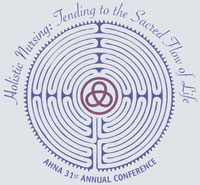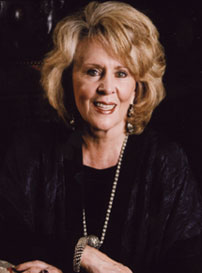I just arrived at the American Holistic Nursing Association’s (AHNA) conference in Louisville, KY and I will be presenting a poster on my efforts toward developing and implementing a holistic-integral nursing education curriculum for RN- BSN students at the University of Maine, Augusta.
I am looking forward to attending this conference to be with like-minded folks, and to experience a time of renewal and healing. I also hope to have some experiences that will support me in the process of moving forward with the continual development of the integral-caring curriculum for the RN- BSN program where I teach.
In my dissertation writing process, I realized that although nursing academia and our curricula tend to mention the importance of holism and addressing patients’ holistic needs, the reality of our actually doing this on a large-scale has been quite limited (Clark, 2005; Rawnsley, 2003). Both students and faculty benefit from and enjoy the teaching-learning process when it is enacted via a holistic framework (Woodward, 2003), which in many ways helps to address some of the many challenges and issues we face in nursing academia.
I am currently teaching a Reiki class to RN- BSN students and I am finding it to be a rewarding experience on many levels. The students are excited and empowered to be learning a modality that they can use for both their own self-healing and supporting the healing of others. As we explore the evidence around the use of Reiki and other complementary and alternative modalities (CAMs), we begin to also question the research processes used to generate evidence in the field of nursing. Students explore their own facilities’ policies around use of Reiki and CAMs, and they begin to take steps to become autonomous in creating their own caring-healing practices.
The Reiki class is taught via a hybrid modality; “academic discussions”, which require use of references, take place online, as do the students’ reflective sharing of their own self-care and healing practices via journal entries. Students read peer-reviewed articles/books on Reiki, and watch videos on Reiki in order to prepare for the online discussion experience. During our face-face meetings, students receive the requisite Reiki attunements and practice giving each other Reiki. We also meditate and share our experiences. As the Reiki Master and faculty of record, I strive to answer the students’ questions and support their learning. Students are also required to write an academic paper that relates the evidence-based literature to their personal Reiki and self-care experiences.
I believe in many ways this Reiki course goes beyond the idea of a holistic approach (which tends to look at the “big picture” and for “larger patterns”) and toward an “integral approach”, which includes a focus on the development of the individual as primary to the growth of the person and their ability to evolve in order to grasp the sort of overarching patterns of self in relation to the world and cosmos. In this way, the integral approach provides a path to, and beyond, holism. I have postulated that an integral education can support nurses in creating sustainable caring-holistic practices as they learn to care for themselves.
Barbara Dossey (pictured here), one of the founding mothers of holistic nursing, has taken the work of Ken Wilber’s (2000) integral quadrant system and evolved it toward application in developing an integral nursing practice.
I believe this is a sign that while holism is important to nurses and nursing, perhaps we need to move toward an even larger framework for developing nursing curricula, where the perceived dichotomies of science-art, experience-evidence, healing-curing, doing-being, quantitative-qualitative, etc. can be better managed and addressed to support nurses in gaining in autonomy in our practices.
There are challenges to creating an integral-holistic-caring educational experience, including a lack of understanding from fellow faculty, administration, and students. For instance with the students taking the Reiki course, a misconception was that they would be studying Reiki in an academic sense versus learning to be Reiki practitioners via (literally) hands-on experience. Students may also take a course like Reiki to simply meet graduation requirements and then continue to remain skeptical or unsure of the modality, or continue to struggle with the importance of self-care and development of the self as primary to the process.
I would love to hear from people about their experiences with developing or receiving an integral or holistic educational experience. What are your challenges and successes?
References:
Clark, C.S. (2005). Human Caring Theory: Expansion and explication. Published Dissertation. UMI: 3158584
Rawnsley, N.M. (2003). Theoretical concerns. Dimensions of scholarship and the advancement of nursing science: Articulating a vision. Nursing Science Quarterly, 16(1), 6-3.
Wilber, K. (2000). Integral psychology: Consciousness, spirit, psychology, therapy. Boston, MA: Shambhala.
Woodward, W. (2003). Preparing a new workforce. Nursing Administration Quarterly, 27(3), 215-222.


Hi,
My name is Suzanne McMurray. I just came upon this post as my instructor Gabrielle Pellicci suggested that I look up some of your work. I am a nurse in the holistic studies program at Georgian Court University. I received my master certificate in integral theory 2 years ago at JFK university. I am very interested in the curriculum that you are working on. I too am a Reiki Master and have alot of ideas swirling about using it with nurses. I believe that Reiki training could be an excellent counter balance to the nursing process training that we give nurses. the nursing process teaches an objective process to assess.plan.evaluate. the reiki training process teaches a subjective process for awareness.intention. validation….both these processes move through the gross-subtle-causal and when combined…I believe you can transform nursing praxis toward a more authentic nursing expertise.
your work sounds fascinating and if you have anything written I would love to read.
smmcmurray8@gmail.com
Thanks
S.
Hi, Suzanne. You are very blessed to have Gabrielle as a teacher and mentor, just as I have been blessed to have her as a friend and colleague.
I have an article on the outcomes the students demonstrated across the quadrants in the Reiki course, but it is in the peer review process right now. I am hopeful it will be reviewed positively and will go on to publication. I am currently writing up the findings and outcomes form our first graduating cohort that really experienced this approach and I am touched by the transformation many of them experienced.
I also have two other articles on the integral approach which are published. I will send you a private email shortly!
In Peace,
Carey